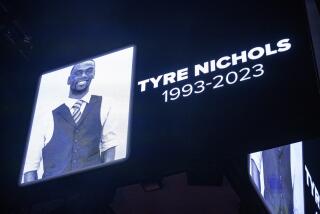Hearing Opens for 3 Marines Accused of Brutality
CAMP PENDLETON — Three Marines brutalized Iraqi prisoners out of anger because they were suspected of participating in the deadly ambush of an Army convoy that included the capture of Pfc. Jessica Lynch, a military prosecutor told a court hearing Monday.
The three -- Maj. Clark Paulus, Lance Cpl. Christian Hernandez and Sgt. Gary Pittman -- are accused of kicking and beating prisoners of war at the Whitehorse detention facility outside Nasiriyah in central Iraq.
Paulus and Hernandez also are charged with negligent homicide in the death of one of the captives, Nagem Sadoon Hatab, 52, a top figure in Saddam Hussein’s Baath Party.
The hearing officer, Col. William Gallo, will recommend to the commanding general of the 1st Marine Division whether the case should proceed to a court martial, be reduced in severity or dismissed.
Capt. Leon Francis, the lead prosecutor, told the hearing that shouting and issuing threats was a common, and acceptable, practice at the facility, but “some Marines took it to the next level” when the three Iraqis suspected of being part of the Lynch convoy ambush arrived.
When one of the Iraqi prisoners made a plaintive reference to his children, Francis said, a Marine snarled, “What about the children of the soldiers killed in that ambush?”
“They used physical force when these prisoners had flex cuffs on their hands and sandbags on their heads,” Francis said in his opening statement at what is called an Article 32 hearing, equivalent to a preliminary hearing in a civilian court.
Hatab was found dead on June 5, after two days in custody. Although the defense plans to dispute the finding, a military autopsy determined that Hatab died from a broken bone in his neck.
Francis said the bone was broken when Hernandez dragged Hatab by the neck out of a holding cell with other prisoners.
But defense attorneys -- civilian and military -- painted a different picture, suggesting that the Marines used appropriate force only when the prisoners became unruly and defiant, and that Hatab died not of a broken neck but of asthma, allergies and other infirmities -- complicated by broken ribs.
Still, Houston attorney Jack Zimmerman, representing Hernandez, conceded that the Marines were particularly angry at Hatab for his role in the convoy ambush, in which 11 Americans were killed and six captured.
Hatab, he said, had been “bragging about killing Americans in that ambush and having an M-16,” captured from a dead U.S. soldier. Hatab continued to “demonstrate resistance and arrogance and hatred for Americans” after being captured, Zimmerman said.
Defense attorneys said Hernandez dragged the semiconscious Hatab out of the holding cell because other prisoners were complaining about the stench from Hatab’s diarrhea on a day when temperatures exceeded 100 degrees.
Hernandez was told by Paulus “to move him by the neck because his body was covered with feces,” Zimmerman said.
Only a week earlier, Marines acting as guards had received a lecture about the dangers of contracting tuberculosis, cholera and other diseases.
To bolster their case that the Marines are guilty of brutality, prosecutors plan testimony by a Naval Criminal Investigative Service agent and by a Marine lance corporal who was initially charged in the case but struck a plea bargain to have charges dismissed in exchange for his testimony.
The Marines are part of a New England-based reserve unit.
Francis said Hatab was forced to lie naked for 10 hours while waiting to be interrogated, and was struck in the face and ribs.
But Zimmerman said Hatab was without clothing because there was a shortage of clean clothing, and was struck only when he acted aggressively by grabbing a Marine by the wrist while being strip-searched.
Pittman is charged with landing a martial-arts kick to Hatab’s chest.
The negligent homicide charges carry a maximum of three years in prison and dishonorable discharge. Other charges include dereliction of duty and assault.
The hearing is expected to last two weeks.
More to Read
Sign up for Essential California
The most important California stories and recommendations in your inbox every morning.
You may occasionally receive promotional content from the Los Angeles Times.










